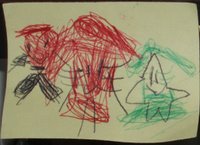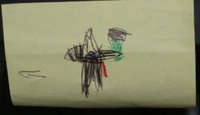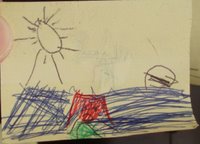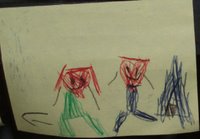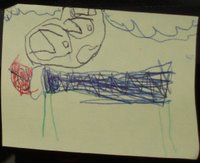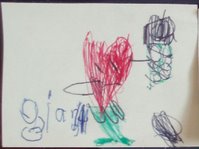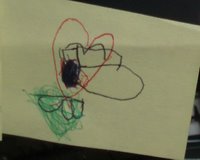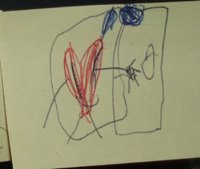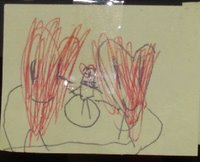Good-bye, Okinawa
When I first came to Okinawa three years ago, I was miserable. It was so hot. The enclosed breezeway that connected our wing of the hotel to the main building was always dripping with condensation and as thick as a sauna, and the weather outside was even worse. Relentlessly bright, stiflingly hot. None of the streets had names, it was nerve wracking trying to remember to drive on the left side of the road, and we lost both the Snow White doll and, far worse, Purple Scarf (Atanasia's security blanket) in the confusion of the trip. Even throwing something away was an ordeal --- why were there two trash cans? What's burnable and what's not? Where do I put the diapers? The empty cans of Diet Coke? All of our shipments were delayed for weeks, and I sat in this empty damned apartment as it got dirtier and dirtier (because a broom doesn't really clean beach sand, and my vacuum cleaner was somewhere mid-Pacific), surrounded by the ugliest damned government-issue furniture imaginable, and every day I wanted to cry.
But, little by little, I found my way under the surface of this place. It turns out that, if you can get away from all of the Americans, the Alternate Okinawa that the Okinawans live in is a vibrant, laid-back, fascinating place. This is the tropical get-away of the Japanese islands, and the people who live here have almost nothing in common with the Salaryman and Office Lady from mainland. Nothing ever happens on time, and nobody cares. People make a living as starving artists here, playing music
 or throwing pottery or making jewelry or carving wood --- plus, of course, the occasional seasonal stint in the bamboo fields or apple orchards. People from mainland move here because they want to opt in to the funky, artistic, deliberately underachieving lifestyle. And I got to be a very peripheral part of that, be the only goofy gaijin shopping for handmade goods on the beach or sitting in the rain listening to Okinawan folk music or feeding my kids pieces of green tea cake
or throwing pottery or making jewelry or carving wood --- plus, of course, the occasional seasonal stint in the bamboo fields or apple orchards. People from mainland move here because they want to opt in to the funky, artistic, deliberately underachieving lifestyle. And I got to be a very peripheral part of that, be the only goofy gaijin shopping for handmade goods on the beach or sitting in the rain listening to Okinawan folk music or feeding my kids pieces of green tea cake  and letting them run around with all the other Okinawan kids and dogs
and letting them run around with all the other Okinawan kids and dogs

while we wait for the festival to start (because the start time on the flyer isn't really the time things start, it's only a suggestion).

I've developed a craving for cold jasmine tea and hot cans of Georgia coffee, and I've finally figured out how to unwrap the cellophane on those triangular rice balls without tearing the seaweed. I can eat anything with a pair of chopsticks, and I automatically reach for the kleenex when I need a napkin. (That's an inside joke: if you've ever lived in Okinawa, you'll know that you generally don't get paper napkins, you get a package of kleenex at the table.)
Now that I've learned all of these West African djembe rhythms, and a lot of excellent technique, from Daiki-san,
 and contributed an idea for one of the t-shirts Mitzu-san silkscreens,
and contributed an idea for one of the t-shirts Mitzu-san silkscreens, 

 now that I've learned all of the choreography for Marco Polo, Amira, and Veil (which I swore I hated, but, well, it's grown on me) from Etsuko-san and Sugako-san,
now that I've learned all of the choreography for Marco Polo, Amira, and Veil (which I swore I hated, but, well, it's grown on me) from Etsuko-san and Sugako-san, now that I've filled my closet and my incense drawer with something new every week from my friend Mr. Victor's Indian store,
now that I've filled my closet and my incense drawer with something new every week from my friend Mr. Victor's Indian store,

now that I've made all of these drummer

and dancer
 and general free-spirit friends, I feel.... Well, not that I don't want to leave, because I do. This past winter was very hard for me, it was so cold and rained so constantly. I was always cold and damp, and mold grew on everything in the house. And in another month, it'll be hot enough to knock you down. Although, strangely, it doesn't bother me now in nearly the same way it did on the day we arrived. And it will be nice to finally be someplace where I can read the street signs and the yellow pages, where I don't constantly feel the pressure to demonstrate that I am not a Damned Gaigin (spit on the occupying army!), I'm a funky laid-back peace activist just like you.
and general free-spirit friends, I feel.... Well, not that I don't want to leave, because I do. This past winter was very hard for me, it was so cold and rained so constantly. I was always cold and damp, and mold grew on everything in the house. And in another month, it'll be hot enough to knock you down. Although, strangely, it doesn't bother me now in nearly the same way it did on the day we arrived. And it will be nice to finally be someplace where I can read the street signs and the yellow pages, where I don't constantly feel the pressure to demonstrate that I am not a Damned Gaigin (spit on the occupying army!), I'm a funky laid-back peace activist just like you.But, once again, I'm so sad I could cry.
























